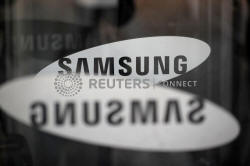Samsung flags smartphone profit fall, upbeat on chips
 Send a link to a friend
Send a link to a friend
 [October 31, 2019] By
Ju-min Park and Heekyong Yang [October 31, 2019] By
Ju-min Park and Heekyong Yang
SEOUL (Reuters) - Samsung Electronics
warned of a smaller mobile business profit on Thursday as its rival
Apple gave a positive iPhone sales outlook, dampening hopes new models
will help the world's largest smartphone vendor finally get back on a
growth track.
Investors have pinned their hopes on a recovery in the mobile business
that once made up over half of Samsung's profit, as its chip operation
remains in the doldrums due to over-supply and weak global demand.
Strong sales of the Galaxy Note 10 smartphone helped the South Korean
firm report its best mobile business profit in six quarters in the three
months ended in September, as it recovers from a battery explosion
scandal in late 2016 that hurt sales.
The mobile business posted a 32% rise in operating profit to 2.9
trillion won ($2.5 billion) in the third quarter, the highest since the
first quarter of 2018.
But Samsung warned that fourth-quarter mobile earnings would decline as
marketing costs rise and sales of flagship models soften from their
post-launch peaks.

The downbeat forecast came hours after Apple Inc said holiday-quarter
sales would beat Wall Street expectations, citing demand for services,
wearables and its latest iPhones.
"The new smartphone effect will likely fizzle out in the fourth quarter,
as people don't find Samsung's new Note model, which came out several
months ago, very attractive anymore," said Song Myung-sup, an analyst at
HI Investment & Securities.
"That will result in a drop in shipments and eventually less profit."
Lee Jong-min, Samsung's vice president of mobile communications
business, told an earnings call that mobile was on a downward trend.
"Although the mobile market in general will soon enter a period of a
strong year-end seasonality, demand is expected to keep trending down
year-on-year due to persistent uncertainties in the global macro
environment," he said.
Samsung is betting on growth in the markets for 5G and foldable phones
next year.
Just this week it unveiled a design for a phone that can fold into a
square, hinting at its next innovation in the foldable segment.
[to top of second column] |

The logo of Samsung
Electronics is seen at its office building in Seoul, South Korea,
March 23, 2018. REUTERS/Kim Hong-Ji

Samsung's smartphone shipments rose by 8% in the third quarter to 78.2 million
phones, outgrowing Apple whose iPhone sales dropped by 3%, according to Strategy
Analytics.
Analysts say Samsung's smartphone sales were boosted by U.S. sanctions on Huawei
Technologies , which hurt the Chinese firm's mobile business in the global
market.
CHIP RECOVERY
In contrast to its caution over the mobile sector, Samsung said chip sales
should pick up next year with positive signs for demand from data-centre
customers and 5G smartphone manufacturers.
The world's largest memory chipmaker said September-quarter operating profit
fell by 56% to 7.8 trillion won ($6.7 billion), slightly above the 7.7 trillion
won estimate the company released earlier. Revenue fell 5.3% to 62 trillion won,
in line with its earlier estimates.
The semiconductor business - by far Samsung's main source of income - reported
operating profit of 3.1 trillion won, less than a quarter of its take in the
same period last year amid oversupply and falling global demand for electronics.
Samsung's profit has slumped on-year for four consecutive quarters and is
expected to fall again in the current quarter, before recovering next year on
the back of stronger chip sales, analysts say.
"Global 5G smartphone sales will be in full swing next year, supporting solid
memory-chip demand growth,” said analyst Park Sung-soon at Cape Investment &
Securities.
Samsung cautioned that prospects for semiconductor sales in 2020 were shrouded
in uncertainty around the macroeconomic environment, a likely reference to the
future of U.S.-China trade relations.
Samsung shares gained 1.8% versus a 1% rise in the wider market as of 0403 GMT.
(Reporting by Ju-min Park and Heekyong Yang; Editing by Miyoung Kim and Stephen
Coates)
[© 2019 Thomson Reuters. All rights
reserved.] Copyright 2019 Reuters. All rights reserved. This material may not be published,
broadcast, rewritten or redistributed.
Thompson Reuters is solely responsible for this content. |